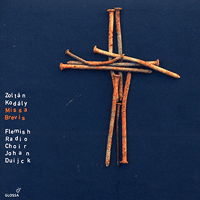All the conductors who have worked with the Flemish Radio Choir, or VRK, have no hesitation in ranking it along side the other two great European chamber choirs, Accentus and the RIAS Kammerchor. Its technical confidence, expressive capacity and profound knowledge of the repertoires, as well as its enormous vision and originality in putting together its programs, are the key factors that have led to the inclusion of this elite group in Glossa's selection of artists. Composed during the Second World War (most of it at a Budapest monastery) and completed in 1944, Missa Brevis was first performed in 1945, just after the end of the war, at the Budapest Opera House (where Kodaly and his wife had been forced to seek refuge during the final days of the conflict). In fact, it was actually performed in the dressing rooms, these apparently being the only part of the building that had not been damaged by the constant air raids on the city. It is one of his most notable choral pieces and subliminally conveys the suffering and uncertainty of that endless time during which Kodaly risked his own life on more than one occasion. While all of this certainly helps to explain its powerful emotional and intensely dramatic qualities, more than anything else Missa Brevis is a hymn to hope, a musical poem of extraordinary transparency written in praise not only of the divinity that governs the destiny of humanity and nations but also, rooted as ever in the popular, of religious feeling, as manifested in believers for comfort and strength in the most difficult of circumstances. |


